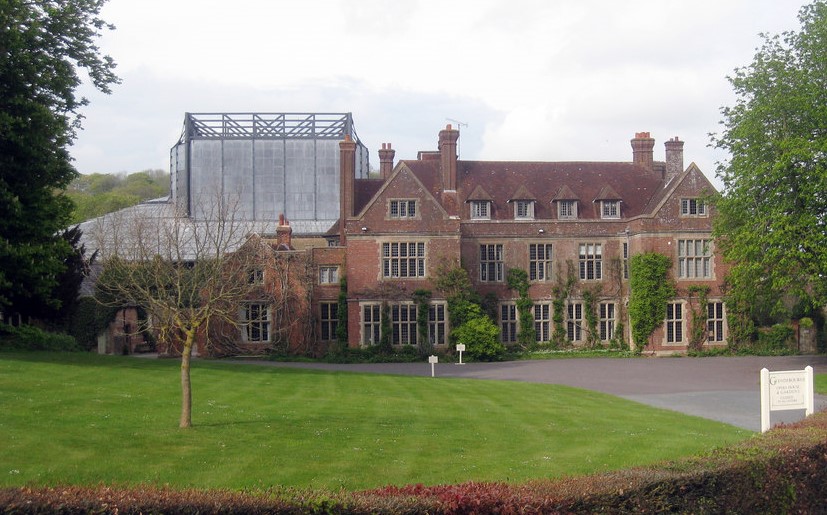
Glyndebourne Opera House, credit Wikipedia
Glyndebourne Festival, 2022
Two new productions from the Glyndebourne Festival: Poulenc’s La Voix humaine & Les Mamelles de Tirésias, Saturday 6th August 2022, Glyndebourne, Lewes, East Sussex, reviewed by David Truslove
Emotional turmoil and exploding breasts bring heartache and hilarity to Poulenc’s double staging at this season’s Glyndebourne Festival. Both works explore different facets of the female psyche, one affecting, the other absurd. The expressive range of these two one-acters may be worlds apart yet form two sides of the same musical coin. While a late Gallic romanticism is embedded in the abbreviated phrases of La Voix humaine (Debussy with a bittersweet twist), echoes of Offenbach and Stravinsky dazzle the ear in Les Mamelles de Tirésias, yet both scores belong unmistakably to a composer once described as “half monk, half hooligan”. Whether elegant or earthy, Poulenc’s scores are brilliantly served in bold, brightly lit productions by the much sought-after French director Laurent Pelly, with stylish performances from the London Philharmonic Orchestra under Glyndebourne’s own Robin Ticciati.
Based on a 1930 monologue by Jean Cocteau, La Voix humaine (1958) was originally written for the French soprano Denise Duval. It is the final adieu of a heartbroken woman known only as Elle who has been deserted by her lover. Charted through a string of broken telephone conversations over some forty minutes, her pain, pleas, self-delusion and final parting is one of Poulenc’s most personal creations in which one feels every momentary shift in mood. In recent years this tragédie-lyrique, an operatic one-off, has had much exposure (virtually achieving cult status as the go-to socially distanced opera), with Barbara Hannigan, Danielle de Niese and Claire Booth creating highly individual enactments.
Now it’s the turn of French mezzo-soprano Stéphanie d’Oustrac, the composer’s great-grand-niece, who sings the role of Elle in a wonderfully communicative performance. She carries a vintage telephone around an empty stage, more a shifting platform serving as both her room and her mind, attempting without success to breathe life back into a failing relationship. To the rear, a red neon strip, variously dwindling and brightening, mirrors Elle’s fluctuating emotions. Dressed in a coat over black nightdress, d’Oustrac brings beauty of tone and, without resorting to histrionics, increasing desperation to this demanding role, winning our admiration and sympathy in every gesture.
No less compelling is Poulenc’s rarely performed Les Mamelles de Tirésias, based on a 1917 production by Guillaume Apollinaire – the poet, playwright, and novelist who added ‘surrealism’ to our vocabulary. This opéra bouffe would have been a perfect antidote to the grim realities of Nazi occupied Paris when Poulenc completed the work in 1944. Yet beyond its escapism and subversive farce there contains a serious message to repopulate a country ravaged by war. This hour-long romp of brilliant invention concerns a marital couple known simply as Thérèse and The Husband. Thérèse relinquishes her breasts (that turn out to be balloons), grows a beard and changes her name to Tirésias. Denied physical relations, her corset-wearing husband learns how to produce children and delivers 40,049 of his own in a single day. If that isn’t surreal enough, the events all take place in Zanzibar. Any chance the work’s gender politics might offend or seem obsolete is negated by the sheer fun generated by Urs Schönebaum’s technicolour lighting and Caroline Ginet’s imaginative sets. These include a vast, stage-filling sheet for the marital bed, an ingenious baby making machine and two pastel-coloured characters (Monsieur Lacouf and Monsieur Presto) bringing echoes of the French mime artist Marcel Marceau. But crowning these are serried ranks of puppet babies, with a front row comprising boisterously bawling manipulators from the Glyndebourne Festival Chorus.
Well defined performances are given by a superb ensemble of largely French-speaking singers, chief amongst whom are the sassy Elsa Benoit as Thérèse and Régis Mengus as her hapless husband. Gyula Orendt makes an impressive foil as the Policeman (his erotic interest in the husband overtly conveyed), with other roles amply fulfilled by Loïc Félix, François Piolino and Christophe Gay. Above all, the cast relish every fantastical detail, and respond to Poulenc’s gleeful, mischievous score with as much commitment as the LPO under Ticciati’s invigorating direction.
Performances continue at Glyndebourne until 28th August
David Truslove is an opera critic










